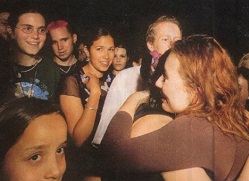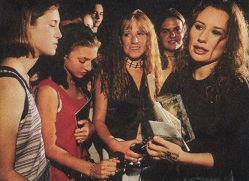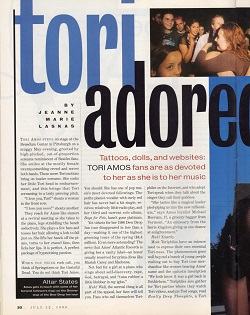|

songs | interviews | photos | tours | boots | press releases | timeline
Entertainment Weekly (US)
July 12, 1996
 
 
Tori Adored
Singer sells out concerts, inspires fan-zines, and wins the hearts of listeners
By Jeanne Marie Laskas
Photographs by Dan Peebles
Tori Amos steps on stage at the Benedum Center in Pittsburgh on a muggy May evening, greeted by high-pitched, out-of-proportion screams reminiscent of Beatles fans. She smiles at the mostly female twentysomething crowd and waves both hands. These mere Tori motions bring on louder screams. She cocks her little Tori head in embarrassment, and this brings that Tori screaming to a truly piercing pitch.
"I love you, Tori!" shouts a woman in the front row.
"I love you more!" shouts another.
They reach for Amos like sinners at a revival meeting as she takes to the piano, legs straddling the bench seductively. She plays a few bars and tosses her hair, allowing a lock to fall just so. She lifts her hands off the piano, turns to her crazed fans, then licks her lips. It is perfect. A perfect package of hypnotizing passion.
When you think rock cult, you think of Springsteen or the Grateful Dead. You do not think Tori Amos. You should: She has one of pop music's most devoted followings. The petite pianist-vocalist with curly red hair has never had a hit single, receives relatively little radio play, and her third and current solo album, Boys for Pele, hasn't gone platinum.
Yet tickets for her 1996 Dew Drop Inn tour disappeared in less than a day -- making it one of the highest grossing tours of the spring ($4.4 million). Even more astounding? The news that Amos' Atlantic Records is giving her a vanity label -- an honor usually reserved for prima divas like Mariah Carey and Madonna.
Not bad for a girl at a piano who sings about self-discovery, rape, God, betrayal, and "tuna rubber a little blubber in my igloo."
Huh? Well, the surreal thing is all part of the appeal, her fans will tell you. Fans who call themselves Toriphiles on the Internet, and who adopt Tori-speak when they talk about the singer they call their goddess.
"She tastes like a magical leader pied-piping us into the new millennium," says Amos loyalist Michael Merriam, 17, a grocery bagger from Vermont. "An emissary from the faerie kingdom giving us one chance at enlightenment."
Huh? Exactly.
Most Toriphiles have an intense need to express their own essential Tori-ness. The phenomenon goes well beyond a bunch of young people rushing out to buy Tori tour merchandise like crosses bearing Amos' name and the quixotic inscription "We both know it was a girl back in Bethlehem." Toriphiles also gather for Tori parties where they watch Tori videos, analyze Tori songs, read Really Deep Thoughts, a Tori fanzine that includes an "ediTORIal," and play Tori trivia games. (Favorite ice cream? Ben & Jerry's Cherry Garcia.) One legendary Toriphile is covering his entire body with Tori tattoos.
All in an effort to express thyself, Tori-style. Take Pat Kochie, 43, a homemaker from Southampton, N.Y. "Tori's songs are more than music," she says. "They're environments. Some songs are actually incubators for my girls."
Her "girls" are her dolls. Hearing "Silent All These Years," a coming-of-age anthem from Amos' 1992 release, Little Earthquakes, encouraged Kochie to do what she had dreamed of: make clay dolls. The first adult doll she sculpted was...Tori. Later she made a Tori-as-infant doll. She gave both to Amos, then went on to sell dolls nationwide to Demi Moore and other notable collectors. Kochie now charges $1,500 for her dolls -- most of which bear a resemblance to Amos. "And as each doll goes in the oven," says Kochie, "I always play Tori's song 'Mother,' as crazy as that sounds."
To Toriphiles, it does not sound crazy at all. On the Web, a search for Tori Amos retrieves thousands of hits, including more than 70 home pages devoted to her. (Her Atlantic Records site received 2 million hits when Boys for Pele was released in January.) And said pages aren't just discographies or downloadable Tori screensavers. We're talking the First International Church of Tori complete with a link to the Altar Room, which is "devoted to praise of our Patron Saint herself." We're talking Tori confessions and Tori testimonials and poems to Tori: "Turn it up, baby... and sing my salvation."
When confronted with the fanaticism her music inspires, Amos, 32, does not accept responsibility.
For one thing, she does not believe that she writes her own songs. They are, she insists, "energy forces" she is merely capturing and translating. "To take credit for them," she says as only Amos can, "would be like taking credit for the sunset if you're a painter."
For another thing, there is this matter of blue cheese. In a Manhattan hotel room prior to taping Late Show With David Letterman, Amos doesn't want to talk inspiration. She's too busy trying to stave off starvation. Room service sent up the salad, the Coke, the asparagus tips, but forgot the blue cheese.
"I'm so hungry I don't know that I'll be able to concentrate," she says. She's dressed in a mismatched thrift-shop jumper and sweater, and heels. Her hair is pulled back, revealing ears that pop out, the kind befitting a child prodigy who believed herself to be a nerd.
Born Myra Ellen Amos (she changed her name to Tori at 17), this daughter of a Methodist preacher studied at the Peabody Conservatory in Baltimore until she was expelled, at 11, for not adhering to the standards of classical musicianship. After releasing the ill-fated Y Kant Tori Read?, a rock-chick rant, in the mid-'80s, she began composing classically influenced piano melodies with breathy, uninhibited vocals and just a dash of blasphemy ("So you can make me cum that doesn't make you Jesus"). On Little Earthquakes she sang about rape -- and gained herself a reputation for songs that foster healing. The album sold more than 2 million, as did its 1994 follow-up, Under the Pink. On Boys for Pele, she sings about breaking up with her boyfriend, and the catharsis gained from a trip to Hawaii; the Pele in the album title is an island fire goddess.
Since her signing in 1986, Amos' label has also exhibited a slavish devotion to her music. "The whole company turned it into guerrilla warfare," says Atlantic Records chief Val Azzoli, who claims he knew that the Amos phenomenon would not follow the path of the typical pop artist. "The Tori fascination is like watching someone go through therapy."
In fact, Amos' manager, Arthur Spivak, was in therapy when he discovered her in L.A. in the early 1990s. "I would drive to my shrink, listening to Tori sing 'Crucify.' It hit me emotionally. She's reaching out to people -- which I think few artists are doing now. Or if they are, it's in a 'The world sucks' way.
"And she's more about healing. You know, these fans, all they're really trying to do is thank her."
Take, for instance, Melissa Caldwell of Columbus, Ohio, who, in 1992, started the fanzine Really Deep Thoughts, which now boasts 800 subscribers. "I wanted to give something back to Tori for what I felt she had given to me," says Caldwell, who receives about 500 letters a month from people expressing similar sentiments in the form of drawings, poems, and testimonials.
As for Amos, she is nothing if not forgiving of her fans' various forms of expression. "I'm too wacky for most weirdos," she says. "Who am I to judge?"
And anyway, there is this matter of blue cheese, which still has not arrived. An assistant heads out on a blue cheese mission herself. She returns victorious and Amos goes at the salad with both hands, smiling with delight.
"If somebody needs to collect a million pictures of me," she says, "well, then that's what they need to do. I mean, some people have baseball cards."
But what about covering your body with Tori tattoos? "Oh, I met that guy," she says. "He was so sweet. He asked me how many more tattoos he should get. I said: 'How many is this? This is a good number. I really love this number a lot.' And I gave him a hug. And he said something to me like 'You know, you're just my friend.'
"And I was like, You know, Tori, just accept that. And that's what I am. I'm, like, a really good girlfriend."
The phone rings. It's someone from room service.
"Hello?" says Amos. "Everything is fine. We got the blue cheese ourselves, so everything is fine. Huh? No, really it's okay. Just tell them to relax... Oh, don't let them scream at you for it. Okay? Oh, everybody has a bad day. I know. I've had bad days, too."
And it goes on like this, Amos the girlfriend -- and guru -- at work.
original article

 

[scans by Sakre Heinze]
t o r i p h o r i a
tori amos digital archive
yessaid.com
|